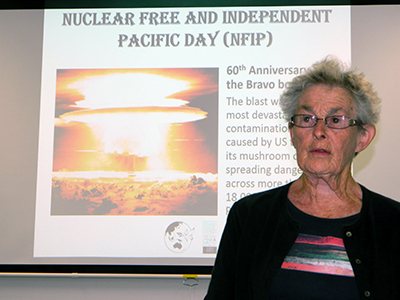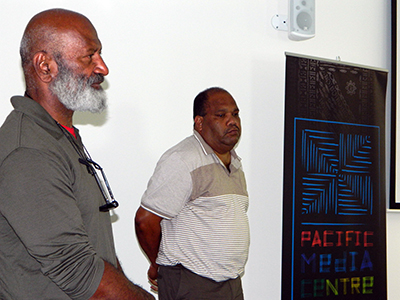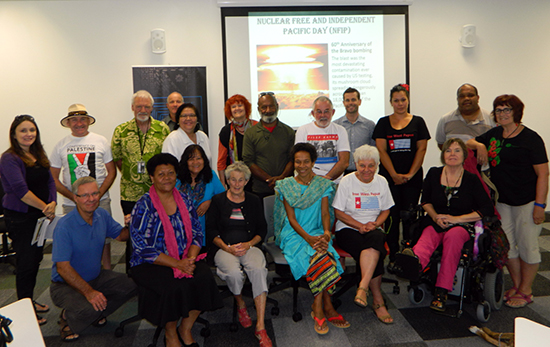AUCKLAND (Pacific Media Watch): Fresh calls have been made for the New Zealand government to end its three-year, $6.34 million project training Indonesian police who are involved in the military occupation and repression of the West Papua region.
The government’s police training programme was slated by Pacific and local community leaders and activists at a conference held at AUT University on Saturday to commemorate international Nuclear Free and Independent Pacific (NFIP) day.
Chilling footage was screened showing Indonesian police invading a peaceful meeting of West Papuans, opening fire and then kicking and beating West Papuans while they were being forced to crawl along the ground. The footage has been handed over to local television stations.
Pax Christi Aotearoa New Zealand representative Kevin McBride said the New Zealand government had falsely billed its police training programme in Indonesia as one which instilled principles of “civil policing and community engagement”.
Former Green MP Keith Locke said it was “clearly not the sort of policing that the New Zealand government should be associated with”.
He doubted that the programme could ever be successful when repressive practices were so entrenched in the Indonesian police and military.
Sometimes the education could work the other way around, Locke said. When he addressed the NZ military staff college in Auckland in the 1990s, Locke discovered that the Indonesian officer present had convinced many of his Kiwi classmates that Indonesia's occupation of East Timor was a good thing.
Last month, Victor Mambor, chairperson of the Alliance of Independent Journalists of Papua, told the New Zealand Herald newspaper that New Zealand's police training of Indonesians was nothing more than "aid that kills".
West Papua was colonised by the Dutch in 1660 and was invaded by Japan during World War Two. When the Dutch eventually recognised Indonesian sovereignty over the Dutch East Indies, this excluded Dutch New Guinea.
Journalists banned
Despite indigenous West Papuans drawing up a declaration of independence in 1961, Indonesia invaded the territory in 1962 and has been occupying it ever since due to the disputed "Act of Free Choice" organised by the United Nations.
Foreign journalists are banned from visiting and there have been continuous allegations of Indonesian police and military atrocities and repression.
The campaign for a free West Papua is also being supported by local organisation Oceania Interrupted, which will continue a series of performances for West Papua at the Auckland Pasifika festival next weekend, says organiser Leilani Salesa.
The NFIP day was organised by the Asia-Pacific Human Rights Coalition (APHRC) in association with the Pacific Media Centre.
The event also commemorated the 60th anniversary of the Bravo bombing of the Bikini atoll by the United States. The 15 megaton bombing saw a mushroom cloud of radiation spreading over more than 18,000 square kilometres of the Pacific – the lasting effects of which are the cause of a current standoff between former residents of the Rongelap atoll, just 120 kilometres from Bikini, and the United States government. Greenpeace executive director Bunny McDiarmid said the US government had recently insisted that any Rongelap resident who refused to return to their still radioactive island would lose any chance of getting compensation.
Greenpeace executive director Bunny McDiarmid said the US government had recently insisted that any Rongelap resident who refused to return to their still radioactive island would lose any chance of getting compensation.
The Rongelap residents were only evacuated after the Bravo bombing, with the US government returning the residents three years later. The residents then asked Greenpeace to evacuate them in May 1985 after experiencing high rates of thyroid cancer and leukaemia. Most have lived away from the atoll ever since.
Pacific Media Centre director Professor David Robie, who was on board the Rainbow Warrior for the evacuation and wrote the book Eyes of Fire about the mission, said that over the years the Rongelap residents had been paid “relatively minor” amounts of compensation, which they now faced losing completely.
'Hellish situation'
“A major legacy from the US period is economic and health imbalances and huge importation of processed food,” he said.
He showed the 1986 video Nuclear Exodus and discussed the background to making it.
McDiarmid added that Rongelap residents had been put in a “hellish situation where they feel forced to move if they want to maintain this support from the US government”.
Although some infrastructure, such as a diving resort and landing strip, has been built, tourists are allegedly being told not to visit the island for longer than two weeks at a time.
Rongelap citizens who have returned to the island had been forced to spend much of their compensation money on “large amounts of potassium for the soil which makes it a little less radioactive”, McDiarmid said.
Conference participants watched an impassioned plea from the late Marshall Islands advocate Darlene Keju Johnson made on behalf of Pacific Islanders at the 1983 World Council of Churches conference in Vancouver, Canada. Luc Tutugoro and Antoine Xulue, who represented the indigenous Kanak people of New Caledonia at the conference, said the island’s independence from French colonial rule was looking doubtful.
Luc Tutugoro and Antoine Xulue, who represented the indigenous Kanak people of New Caledonia at the conference, said the island’s independence from French colonial rule was looking doubtful.
Tutugoro said that while there was “great enthusiasm for the French to leave”, about 6700 French citizens who had recently settled in New Caledonia had been put on the electoral roll.
The Kanak people had been forced to mount a court challenge to this as the French votes could “drown out the vote of Kanaks” in the forthcoming referendum on the political future, said Xulue.
Joan Macdonald of the Women's International League for Peace and Freedom (WILPF) delivered a message to the conference on the New Zealand initiative as part of ICAN - the International Campaign to Abolish Nuclear Weapons.
Conference delegates called on the New Zealand government to seek an international conference of governments to discuss a total ban on nuclear weapons, and for all members of Parliament to sign the global parliamentary appeal for a nuclear weapons ban.
A resolution was also passed calling for the demilitarisation of Guam, an American occupied island in the North Pacific which has experienced a growing concentration of militarisation in recent years.



